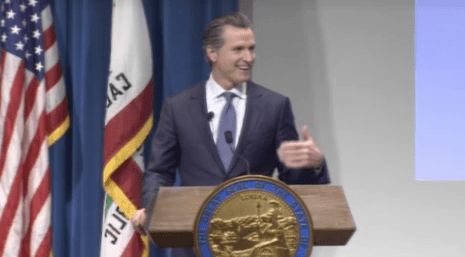Note: GJEL Accident Attorneys regularly sponsors coverage on Streetsblog San Francisco and Streetsblog California. Unless noted in the story, GJEL Accident Attorneys is not consulted for the content or editorial direction of the sponsored content.
In the presentation of his first state budget, California Governor Newsom made some startling statements connecting housing with transportation funding. During his long and detailed speech--he talked for almost an hour before taking questions from reporters--he said he would withhold gas tax funds from regions that did not meet state housing goals.
It was an exciting prospect, for the time it lasted.
Newsom's speech made it clear that housing and homelessness are top priorities for his administration. His budget includes "an extra $1.75 billion for housing," which he said would be "incentive based." The state, he said, will come up with a new way to estimate and allocate housing needs that is more "realistic and nuanced" than the current system wherein each region defines its own regional housing needs and allocates them to cities, frequently based on not much more than local preference. The state would provide funding and technical assistance to regions to meet those assigned housing goals.
But, said Newsom, if regions "don't reach those goals, we are going to take the S.B. 1 money. [If] you're not hitting the goals, I'm not sure you should get the money."
When questioned how that would work, he said he was using the term "S.B.1"--the name of the gas tax--as a proxy for discretionary transit funding. He pointed to groups that "are already playing around with this idea of using transit money" to incentivize housing. One such group is the Metropolitan Transportation Commission in the Bay Area, which has been using transportation funding to encourage cities to build housing near transit rather than in outlying and more car-dependent areas.
Newsom's statements about tying transportation funding to housing were both exciting and confusing.
Exciting because the new governor clearly understands how important it is to make the connection between planning for housing and for transportation. Despite years of state attempts to encourage understanding of how the one affects the other, planning for each has long been done by very different groups with very different concerns. Also, money for transportation has always been easier to come by, given our habituation to using gas and other taxes, than money to build housing. Connecting the two would be a huge win.
But confusing as well, because, for one, S.B. 1 not really a proxy for transit funding. It's a relatively minor portion of the gas tax; other transit funding has its own rules that would be difficult to circumvent; "discretionary" transit funding is pretty limited.
But Newsom's statements were also confusing because threatening to withhold transit funding by itself is not that big of an incentive to build housing. In fact, it could backfire.
Cities that don't already have enough low-income housing would lose money for transportation that mostly serves low-income residents. Also, many cities that don't meet their current housing allocations are in car-dependent areas where they care more about impacts on driving--so having their transit funding threatened wouldn't mean very much to them.
It would take new legislation to be able to withhold gas tax money, and that would mean an ugly fight. Senator Jim Beall, head of the Senate Transportation Committee and author of S.B. 1, responded to Newsom's announcement with a statement saying: “We have an obligation to the voters who overwhelmingly supported S.B. 1 that addresses the enormous local and state backlog of road safety and repairs needs. I certainly hope these funds, dedicated to fill potholes and [fix] dangerous road safety projects, will not be delayed.”
It may just be that Newsom's team hasn't yet worked out the details. The actual language in his proposed budget simply says that
Going forward, the state will strongly encourage jurisdictions to contribute to their fair share of the state’s housing supply by linking housing production to certain transportation funds and other applicable sources, if any. The Administration will convene discussions with stakeholders, including local governments, to assess the most equitable path forward in linking transportation funding and other potential local government economic development tools to make progress toward required production goals.
The governor's staff hasn't responded to requests for clarification yet, and advocates and state workers Streetsblog checked in with seemed taken by surprise by the proposal. Expect more details to emerge in the weeks before the budget is revised in May.
Meanwhile the rest of Newsom's speech was a deep dive into budgetary specifics. In addition to prioritizing housing and homelessness, he plans to increase spending on healthcare and education, and expand the Earned Income Tax Credit. Look for coverage on those issues in other outlets.






